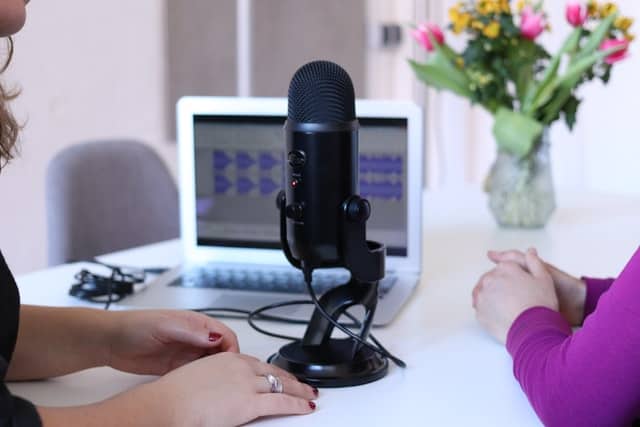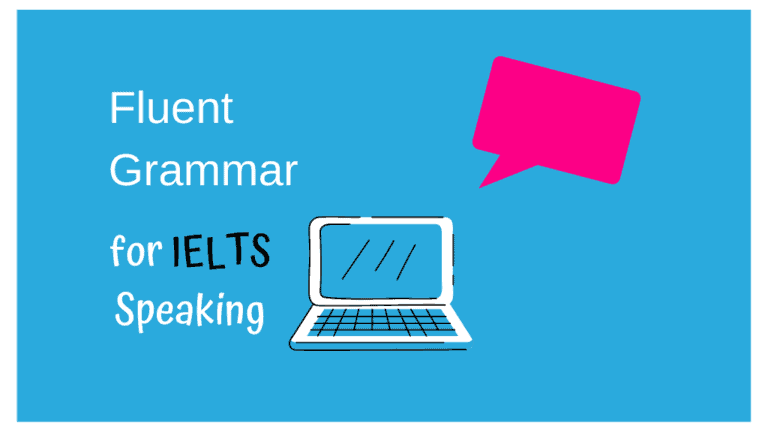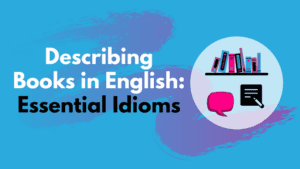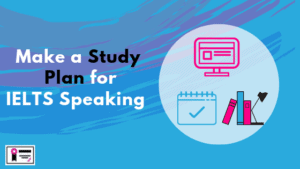Many students ask me this question
Keith, why am I not fluent in English yet?
So today, I will tell you why I think you are not fluent in English yet, and what you can do about it.
You will get some key ideas that will help you improve your fluency and so help you get a higher score on the IELTS Speaking test.
Table of Contents
What affects your fluency in IELTS Speaking?
Some people think the 4 skills of IELTS Speaking (Fluency, Vocabulary, Grammar and Pronunciation) are separate.
In fact, the IELTS Band Descriptors for speaking might encourage you to think like this, because they show you how each skill is evaluated separately.
However, these skill are not separate!
Actually, they are all closely inter-connected.
So, fluency is actually affected by your vocabulary, grammar and pronunciation, as well as several other factors.
This means when you want to work on your fluency, you need to work on all 4 skills together in a holistic way.
Let’s find out more about this and how to work on developing them all.

Vocabulary affects fluency
Well, let’s think about it first of all, as you’re speaking, finding the right word is going to affect your fluency.
If your vocabulary is not big enough, or you’re trying to use difficult words you don’t fully know, or if you confuse words from word families (e.g. economy, economic economist), this will create hesitation and affect fluency.
How do you solve that?
Well, the first thing is to start activating your vocabulary.
It’s all well and good reading vocabulary but if you’re not speaking it out and activating it, it’s not going to come fluently.
We have two kinds of vocabulary, passive and active.
Passive vocabulary are the words you recognise and you can read.
And if you hear them, you know them, but you may not be able to use them.
Active vocabulary are the words that have gone from passive to active, and you can actually start using them correctly.
So getting as much vocabulary as you can into your active ‘pool’ is really important, so you can start using it.
That builds up your fluency.
A key tip is, if you don’t feel comfortable or you’re not sure how to use a word, don’t use it in the test.
Why? Because if you get it wrong, your vocabulary score comes down and also your fluency will come down because you can’t use it properly or fluently.
How to activate vocabulary to improve fluency
So, the way to activate your vocabulary is to repeat words and phrases in context.
What’s more, practice using them in different contexts.
There is research that shows you need to see the word in for at least four different contexts to recognise it, and to be using it in at least three or four different contexts before it becomes active.
So practice repeating the words in different conversations, different answers, and different contexts.
Make sure you’re not memorising your answers, which means you are only using words in one context. That is not good. Be flexible. Use new words in different contexts.

Grammar affects fluency in IELTS Speaking
When you’re speaking and you’re thinking about the correct grammar, that also affects how fluent in English you are.
So what you want is to try, as much as possible, to automate your grammar (i.e. make it automatic, so you don’t have to think so much about it)
If you can automate your grammar, even a little, then you’re going to be speaking more fluently.
Think about famous basketball players. What do they do?
They bounce the ball and they shoot, then they bounce the ball and they shoot again, and they spend hours shooting.
They practice repeating and repeating, until they automate the move, because when they’re playing on the court, they haven’t got time to think. They need to be automatically dribbling, passing and shooting. So they need to automate as much of that as possible.
Well, guess what? It’s the same with speaking English.
If you can automate some of the grammar, you can just use it much more fluently and then focus more on ideas and fluency when you’re speaking.

How to automate grammar to improve fluency
So how can you start to automate your grammar?
Well, similar to the basketball player, you need intense repetition.
In fact, I have something called the Fluency Gym, which is about intense repetition.
In the Fluency Gym, you’re taking some grammatical structures and repeating them again and again, until you start to automate them and become much more confident with them.
A focus on words rather than chunks, affects fluency
Another thing connected to both vocabulary and grammar, is that a lot of students focus on individual words. So they are putting the words together more slowly and with more hesitation.
I think you need to change that focus from words to phrases (or chunks).
In a recent interview with the polyglot, Steve Kaufmann, we talked about phrasing, which is the idea of thinking about phrases of language, (e.g. three or four words together) rather than individual words.
It is such an important part of being fluent in English.
For example, here’s a chunk of language,
to be honest
Now, if I’m thinking about words – ‘to‘ + ‘be‘ + the adjective ‘honest‘,
I’m thinking of three words!
However, if I think of a chunk or a phrase, instead of words – I only have to focus on one sound,
If I can automate phrases like this, then that’s going to help my fluency.
Focusing on chunks and phrasing is much more important than individual words.
Notice that many spoken fillers or connectors are actually chunks, and we can learn them as sounds, instead of words. For example,
on top of that
for starters
to kick off
first of all
without any doubt
by and large
in a nutshell
How to practice chunks
Having practiced a chunk, we then need to build flexibility by practicing similar chunks. This will also help us hardwire the grammatical or lexical structure. We can do this with simple substitution drills.
Let’s take an example with this structure,
I enjoy going out
Now let’s practice substitution. We will change the last word
I enjoy going out.
I enjoy cooking.
I enjoy painting
Make sure you say the whole phrase as one sound. The mistake most people do is that they say the stem, “I enjoy”, then think of the word they are going to change, pause, and then add the extra word. So it is no longer a chunk. The results is
I enjoy (pause) cooking
That’s not helping because they’re thinking and they’re causing the hesitation.
So when you’re practicing like this, think first speak second.
Make sure you say the whole phrase / chunk fluently, without the hesitation.
This is the intense practice of the basketball player.

Pronunciation affects fluency
We have talked about grammar, vocabulary and chunks. Let’s look now at pronunciation.
If you can’t pronounce sounds and words correctly, or it’s difficult for you, that will affect your fluency.
Likewise good word stress, sentence stress, and intonation are all critical for becoming more fluent in English.
One of the key things between getting a band 6 and a band 7 or 8 is the long turn.
That is being able to speak a long sentence (or several sentences), maintaining or sustaining, correct intonation.
So getting that natural spoken English intonation over longer sentences is critical is you want a band 7 or above.
So how do you work on intonation?
It’s not easy at all, and there are no hard and fixed rules about it.
However, you can find lots of practice in the Fluency Gym videos.
Nerves affect fluency
Another thing that influences your fluency of course, is nerves.
If you’re nervous, that can ruin your fluency. Many candidates ruin their test by letting nerves take control. They can’t breathe, can’t think, hesitate and lose control.
There are several things you can try to control your nerves, including controlling your breath, accepting nerves, using posture, the 3-3-3 approach and so on.
I have done a video about handling nerves in the test that you can check out here.

Thinking of ideas affects fluency
The other thing that can seriously affect your fluency is thinking of ideas. Especially when have to do that so quickly.
So it’s not just getting the words, but also getting the idea, getting it quickly enough, processing it and bringing it out through your mouth.
I think the best way to improve that, is to do lots of research on the common IELTS Speaking topics before the test. Read and listen as widely as you can. There are plenty of resources for that here.
Solutions to be more fluent in English
Having used the Fluency Gym for months in my live lessons on Youtube and with students in one-to-one classes, I decided to go a step further and create a complete online course that starts to address many of the factors mentioned above that affect fluency.
It’s called FLUENT GRAMMAR for IELTS SPEAKING and improves your fluency by,
- starting to automate your grammar
- giving intense repetition of phrases, focusing on chunks
- substitution practice to build flexible use of vocabulary
- working on a range of natural intonation patterns
If you like the ideas in this video, you can go and check out the online course via the button below, and see if it right for you.
Let me know what you think!






8 thoughts on “Why You Are Not Fluent in English Yet!”
Hi Mr Keith,
So Thankful ! It helps a lot .You open up a different path for learning English for me !!
So pleased to hear that and hope you enjoy your English journey!
I watched all the lessons. They are informative and valuable to enhance my speaking and confidence level.
Thank you…Adios Amigo…Keith!!!
So pleased they can help you. Keep practicing – y hasta luego!
Good and interesting
Glad you like it!
Hello, Keith
I want to improve my speaking skill and I need online lessons with you to practice. Actually, I haven’t got someone who can practice with me English.
To be honest, I am not confident when I speak in English, because, by and large, I don’t think in English. I am going to pass IELTS, but not yet. I always dreaming to speak in English just like a native speaker.
It would be helpful if you give me more details about the lesson. Please write me an email.
Best regards,
Goo
Hi Goo, I am afraid I am not giving one on one classes at the moment. Keith